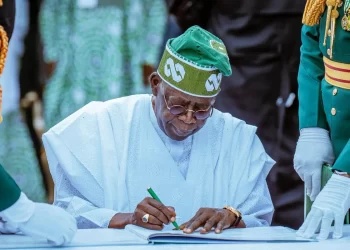The Academic Staff Union of Universities (ASUU) will on Monday (today) commence a two-week warning strike after the ultimatum issued to the Federal Government elapsed on Sunday.
The announcement was made by the National President of the union, Prof. Chris Piwuna, at a press briefing at the University of Abuja on Sunday.
The renewed standoff between ASUU and the government comes amid ongoing negotiations aimed at averting another round of industrial unrest in public universities.
Last Wednesday, the Minister of Education, Dr Tunji Alausa, disclosed in Abuja that the government had entered the final phase of talks with ASUU and other unions to resolve lingering disputes over welfare, funding, and the implementation of the 2009 ASUU-FGN Agreement.
Alausa noted that the Tinubu administration had already made significant progress with the release of N50bn for the payment of Earned Academic Allowances, while another N150bn had been captured in the 2025 budget for needs assessment, to be disbursed in three tranches.
But declaring the strike, Piwuna stated, “Compatriots of the press, it goes without saying that there is nothing sufficient on the ground to stop the implementation of the ASUU-NEC’s resolution to embark on a two-week warning strike at the expiry of the 14-day notice given on the 28th September 2025.
“Consequently, all branches of ASUU are hereby directed to withdraw their services with effect from midnight on Monday, the 13th October, 2025. The warning strike shall be total and comprehensive as agreed at the last NEC meeting.’’
Our correspondent learnt that the Federal Government had extended an invitation to the union last Friday in a bid to meet the deadline set by ASUU leadership.
During the meeting, the government presented a proposal to ASUU, which was rejected by its leadership because the new offer did not meet the demands presented by the union.
ASUU is currently demanding the conclusion of the renegotiated 2009 FGN-ASUU agreement, release of the withheld three and a half months’ salaries, sustainable funding of public universities, revitalisation of public universities and cessation of the victimisation of lecturers in Lagos State University, Kogi State University, now Prince Abubakar Audu University and Federal University of Technology, Owerri.
Others are payment of outstanding 25-35% salary arrears, payment of promotion arrears for over four years and release of withheld third-party deductions( cooperative contributions, union check-off dues).
Though the meeting between both parties ended in a deadlock, a highly placed source in the ministry who was privy to the interactions between the ministry and ASUU leadership noted that the education minister made efforts to reach out to the leadership of the union, but his phone calls were rejected.
“The minister made efforts to reach out to the leadership of the union, but they refused to pick up calls. A proposal was made, but they went ahead with the strike.”
ASUU’s president, Piwuna, earlier confirmed that the proposal by the government was rejected. He noted that the union was working towards presenting its own proposal to the government.
“The presentation to ASUU was a total departure from the letter and spirit of the review of the draft agreement submitted by the Yayale Ahmed committee to the ministry.”
“ In consonance with our union’s principles, ASUU will soon submit its position – pointing out areas of deliberate distortion, inconsistency and flagrant disregard for extant laws, policies and practices – to the Federal Government.
“Suffice to state, however, that the hurriedly packaged documents were provocative and incapable of dousing industrial tensions which had reached an irreversible pitch across our campuses.
“The Federal Government raised our members’ hopes in resolving the lingering issues before we held the August 2025 NEC meeting at the Usmanu Danfodio University, Sokoto, by asking for three weeks of grace to sort out things.
‘’It was a hard sell, but the leadership managed to convince NEC to exercise a little more patience. The pre-UDUS NEC hope was dashed without a blink,” Piwuna noted.
ASUU has a history of strikes driven by various issues, including unpaid salaries and promotion arrears affecting lecturers’ financial stability and morale, poor funding leading to infrastructure decay, inadequate facilities, and limited research capabilities in public universities, lack of genuine government commitment and failure to implement previous agreements eroding trust between ASUU and the government and dissatisfaction with working conditions, among others.
Meanwhile, the Federal Government on Sunday night threatened to invoke the no-work-no-pay policy following ASUU’s strike declaration.
In a joint statement, the Minister of Education, Alausa and the Minister of State for Education, Prof Suwaiba Ahmad, called on the ASUU to reconsider its decision to embark on an industrial strike, emphasising that constructive dialogue remains the most effective and sustainable path toward resolving all outstanding issues in the tertiary education sector.
In a statement issued by Folasade Boriowo, the spokesperson of the Federal Ministry of Education, she disclosed that the Federal Government has made a comprehensive offer to the union and is still awaiting ASUU’s official response.
The ministry emphasised that the offer addresses the union’s primary concerns, including working conditions, institutional governance, and staff welfare.
It accused ASUU of not being cooperative despite efforts by the government to avert the strike declared by the union.
“The ministers further stressed that the government has continued to prioritise the welfare of university staff and the stability of the academic calendar under the Renewed Hope Agenda of President Bola Ahmed Tinubu, GCFR.
‘’According to them, dialogue remains the most effective and sustainable path to resolving disagreements, and government remains open to engagement at any level to prevent unnecessary disruption in the education sector.
“They, however, emphasised that the “no work, no pay” policy remains an extant labour law of the Federal Republic of Nigeria, and the government will be guided by this law should academic activities be disrupted in the nation’s universities.
‘’While government continues to demonstrate goodwill and flexibility, it will not abdicate its responsibility to uphold fairness and accountability in the use of public resources.’’
The statement reassured Nigerian students, parents, and the general public that the Federal Government is firmly committed to maintaining industrial harmony in the tertiary education system.
“The ministers appealed to all academic unions to embrace partnership and dialogue rather than confrontation, in the collective interest of the nation’s higher education system.
“They reiterated that the government’s education reform agenda is designed to enhance teaching and research conditions, promote institutional autonomy through strengthened university governance, and ensure that the academic community thrives in an environment of mutual respect, productivity, and innovation.”
Meanwhile, the National Association of Nigerian Students has urged the Federal Government to demonstrate sincerity and urgency in resolving the fresh industrial action declared by ASUU.
The Assistant General Secretary of NANS, Adejuwon Emmanuel, appealed in an interview with The PUNCH in Abuja on Sunday.
Reacting to the development, Adejuwon said NANS had been closely monitoring the situation and was deeply concerned about the impact on students.
“We have been monitoring developments surrounding the industrial action declared by ASUU over lingering issues with the Federal Government.
“We are aware that the University of Jos chapter of ASUU recently met with the management of the institution and student leaders to explain their grievances, which include unresolved matters relating to welfare, funding, and government obligations,” he said.
Adejuwon disclosed that the NANS President, Olushola Oladoja, had initiated consultations to mediate between ASUU and the Federal Government.
“The NANS President has since commenced high-level consultations aimed at mediating between ASUU and the government to avert the strike.
“We commend both parties for previous dialogue efforts and urge them to once again embrace negotiation in the interest of the nation’s educational system. Nigerian students have endured too many disruptions, and another strike will only worsen their hardship,” he added.
While acknowledging ASUU’s legitimate concerns, NANS appealed to the union to explore other forms of engagement that would not further destabilise the academic calendar.
“We urge the Federal Government to show sincerity and urgency in addressing the issues at stake. The future of Nigerian students must not be sacrificed on the altar of bureaucracy and broken promises,” Adejuwon said, adding that the association would not “sit idly by if students’ education is once again jeopardised.”
In a related development, the Academic Staff Union of Polytechnics has given the government a six-week timeframe to attend to its demands.
The polytechnics’ lecturers said the decision to suspend the proposed strike was based on the fact that the Minister of Education has shown good faith in addressing some of their demands.
The union had served the government a 21-day ultimatum notice after its emergency National Executive Council meeting on 15th August, 2025.
The ultimatum listed a number of items of dispute requiring the urgent intervention of the government.
But ASUP said following a series of structured engagements with the government through the minister’s office from the effective date of the ultimatum to date, NEC reconvened on October 9, 2025, at its 115th meeting to review the response and commitment of the government towards effective resolution of the issues.
According to the statement, NEC particularly took note of the release of the circular by the National Salaries, Incomes and Wages Commission, concerning the Peculiar Academic Allowance and measurable progress made in the release of the 2025 cycle of the NEEDS ASSESSMENT intervention for polytechnics.
It further noted the resumption of meetings of the Polytechnics Implementation Monitoring Committee and the scheduled monitoring and evaluation activities as a prelude to assessing the 2025 NEEDS ASSESSMENT cycle; the reconstitution of the Federal Government Renegotiation Committee to accommodate the polytechnics sector, and the decisive disposition of the FME in calling the rectors of Federal Polytechnics Nekede and Ekowe to order.












































